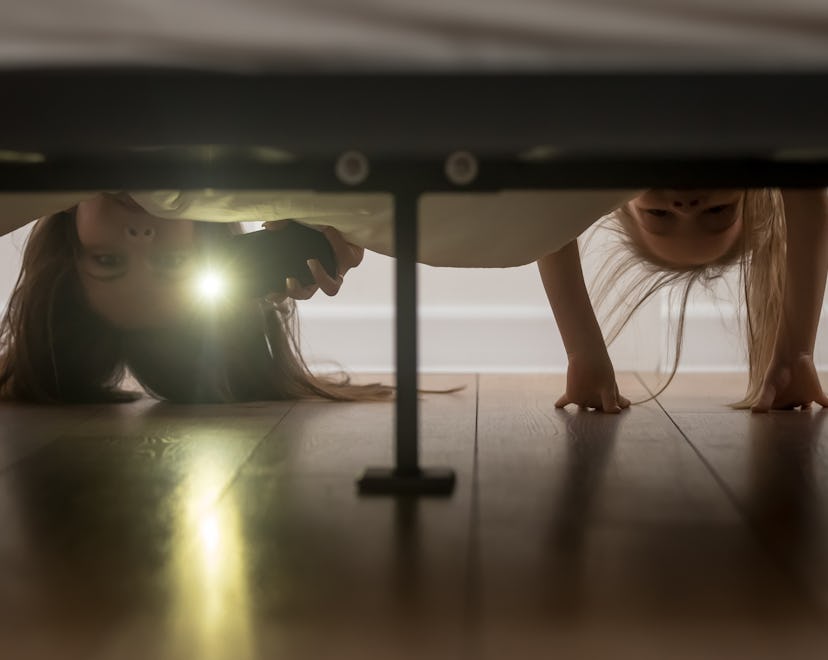Kid Milestones

Kids Becoming Afraid Of The Dark Is Evolutionary
But here’s how to help them cope.
There are some childhood milestones that you just fully expect, no matter what. You expect them to suddenly hate all vegetables, to have an independence streak (“I can do it myself!”), and you expect kids to become afraid of the dark. The trick is knowing when and why these milestones happen. How can a newborn who sleeps in a pitch black room for months into years suddenly become a big kid scared of the dark?
My own daughter stood at the entrance of her room, shuffling from side to side. Obviously, she was doing the peepee dance, but why wasn’t she taking those few steps to get to the bathroom?
“Baby, go pee,” I said.
Her twin sister looked and said, “I’ll go with her.” She could clearly tell the look on my face meant, why does she need a partner to walk to the bathroom? “She's scared of the dark, mommy.”
Since my girls were swaddled in their cribs, I’ve always had a nightlight in their room. When they could walk, I added nightlights to illuminate a pathway to our bedrooms and the bathroom. Not only so they could visibly find their way while trying to shake off the sluggishness of sleep, but so they would also not be too afraid of the darkness to come find mommy.
The dark has never been an issue, but at the age of 8, it suddenly had the power to keep my child from stepping foot in the hallway to relieve herself. What changed?
When do kids become afraid of the dark?
Child psychologist and author of When the World Feels Like a Scary Place, Abigail Gerwitz, says, “There isn’t really a typical age range. It really depends on how temperamentally anxious kids tend to be.” She says to think of it as something you’re born with. And temperament is something you can notice really early on.
“Kids who are more temperamentally anxious might show fears earlier than other kids, at a higher intensity. So a more anxious child might express nighttime fears, including fear of the dark, as young as they can talk about them, while a less anxious child might only report being afraid of the dark after something has happened to precipitate the fear,” Gerwitz tells Romper. She also notes that “anxiety in general peaks in typically developing kids at around the age of 9.”
My earliest recollection of being afraid of the dark came from being around when my older brother watched scary movies or when my mom watched Unsolved Mysteries — Robert Stack’s voice creeped us all out. Because of this, I tried my best to shelter my kids from fear-inducing shows and societal messages that monsters come out at night.
The dark, however, can also be seen as a hiding spot for things that our kids may already secretly fear.
“Fear is hardwired and evolutionarily important. We couldn't survive if we didn't have fear,” Gerwitz says. And if the dark represents all the scary things our kids can’t understand, no wonder they cry, scream, or allow it to paralyze them. “Fear is a signal of danger, and in olden times when there was no electricity or artificial lighting, the dark could bring danger.”
So it’s not really the dark they’re afraid of, but the idea that bad things that can happen when it’s dark.
For younger children (5 and under), Gerwitz says they “have a hard time distinguishing fantasy from reality,” so they don’t know the monsters aren’t real. And this stress and anxiety can affect their little bodies, causing heart palpitations, sweats, and stomach aches.
How can parents help when kids are afraid of the dark?
- Validate their fears. “Help your child label and identify what they’re feeling,” Gerwitz says. Once they have vocalized what is bothering them, you can verify their emotions by sharing that you used to be afraid of the dark as a kid.
- Brainstorm a solution. After identifying the issue, collaborate with them on how to feel less scared and let them lead the task of making a plan. Inviting them into problem-solving provides a distraction and strengthens their motivation to get past the fear. Gerwitz says, “That will empower them to learn they can manage their fears.”
- Never ridicule children for their fears. “They already feel vulnerable. Punishing them or laughing at them can teach them that they can't trust their emotions, or worse, that emotions are themselves dangerous,” Gerwitz tells Romper.
Overcoming fear of any kind is a process that even adults don’t always deal with in the best ways, so be patient. If your kids are dreading the lights being out, you’re not alone.
“Many, many kids are scared of the dark — it's very normal,” Gerwitz says.
Expert:
Abigail Gerwitz, Ph.D., L.P. and child psychologist
This article was originally published on